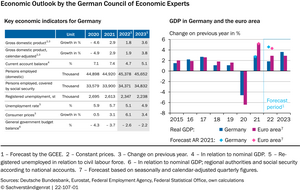The outlook for the economy in Germany and the euro area has worsened sharply due to Russia’s war of aggression against Ukraine. The German Council of Economic Experts (GCEE) has therefore lowered its economic outlook: The GCEE expects the gross domestic product (GDP) for Germany to grow by 1.8 % in 2022 and by 3.6 % in 2023. The pre-crisis level from the 4th quarter of 2019 will most likely not be reached until the 3rd quarter of 2022. The current geopolitical situation creates great uncertainty with regards to future economic developments.
Both the increasing industrial production and the robust labour market pointed to an economic recovery prior to the outbreak of the war. Russia’s war of aggression against Ukraine has now worsened considerably the economic environment. "The war has exacerbated the disruptions of supply chains that were already strained due to the coronavirus pandemic. At the same time, the once again sharply increasing prices for natural gas and crude oil are significantly affecting companies and private consumption", explains council member Achim Truger. In summer 2022 consumption of contact-intensive services is expected to recover further and, thus, contribute positively to GDP growth. However, the coronavirus pandemic continues to pose a risk to growth.
The considerable increase in prices for fuels and the protracted pass-through of companies’ increased energy costs to customers will cause consumer prices to rise further this year. The GCEE therefore expets the inflation rate to climb to 6.1 % in 2022, before declining to 3.4 % next year. "High inflation and rising inflation expectations are likely to influence wage negotiations. The momentum for wage demands is likely to increase beginning in the second half of 2022. This increases the risk of a wage-price spiral", says council member Veronika Grimm. For 2022, the GCEE expects the wages actually paid by companies to grow by 2.5 %. In the next year wages may rise by 4.4 %.
Russia’s war of aggression against Ukraine and shortages especially for intermediate inputs and labour are weighing on economic growth in the euro area. Positive impulses result from the robust labour market, private consumption and government consumption, which is likely to expand for example due to the implementation of the national recovery and resilience plans in the member states. Therefore, the GCEE expects GDP in the euro area to grow by 2.9 % in 2022 and 2023.
The GCEE’s current outlook is subject to very high uncertainty. The effects of Russia’s war of aggression against Ukraine are difficult to assess at the moment: In particular, a further intensification of the conflict and an expansion of the sanctions could put significant additional strain on the German and European economy. "Germany is heavily dependent on Russian energy supplies. A suspension of these supplies entails the risk that the German economy slides into a recession with significantly higher inflation rates", explains council member Monika Schnitzer.
"Germany should immediately make every effort to take precautions against a potential suspension of Russian energy supplies and to quickly end its dependence on Russian energy sources", demands council member Volker Wieland. In this way, energy security in Germany can be increased in the long term - even if this would mean that energy prices would remain elevated for some time. Higher energy security strengthens the position of Germany and the EU in relation to Russia. At the same time, greater independence from Russian energy supplies can increase the resilience of the German economy.
Updated Economic Outlook 2022/2023
Recording of the Press Conference in German (HTML)

